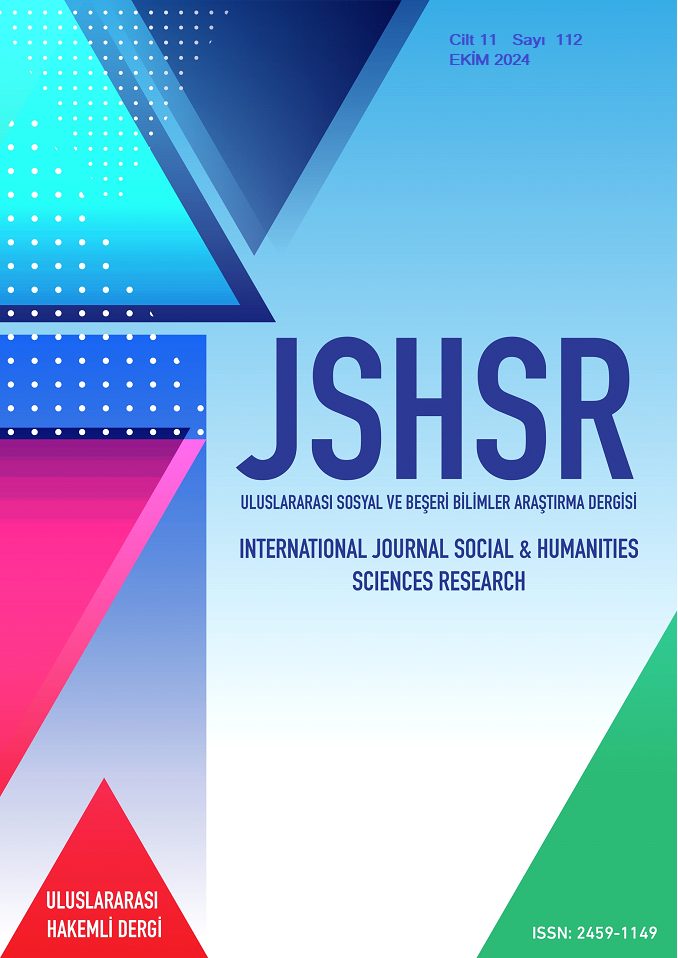An Examination of Primary School Teachers' Attitudes Towards Artificial Intelligence in Relation to Various Variables: The Case of Kastamonu
DOI:
https://doi.org/10.5281/zenodo.14028429Keywords:
Artificial Intelligence in education, attitudes, primary school teachersAbstract
Ö The aim of this study is to examine the attitudes of primary school teachers working in Kastamonu towards artificial intelligence (AI) in relation to gender, years of experience, and the type of faculty from which they graduated. The research, conducted using a descriptive survey model, was based on voluntary participation. The study group consisted of 126 primary school teachers working in public schools in Kastamonu during the 2024-2025 academic year. The data were collected online using the Turkish version of the General Attitudes to Artificial Intelligence Scale, which was adapted and authorized by Kaya et al. (2022). The analysis revealed that primary school teachers' attitudes towards AI differed based on gender, while no significant differences were found in relation to years of professional experience or the type of faculty they graduated from. These findings provide important insights for improving primary school teachers' attitudes towards AI and promoting the more effective use of these technologies in education. Based on the research, the following recommendations were made: Comprehensive training programs for teachers could be organized to enhance the effective use of AI technologies in education. These programs could particularly help female teachers and those with lower levels of education to adopt AI. The Ministry of National Education could organize more seminars and workshops to raise teachers' awareness of AI technologies. Broader research studies on attitudes towards AI could contribute to a better understanding of teachers' use of these technologies and their impact on education. Additionally, special support programs and mentoring initiatives could be developed to improve female teachers' attitudes towards AI technologies.
References
Akalın, B., ve Veranyurt, Ü. (2020). Sağlıkta Dijitalleşme ve yapay zekâ. SDÜ Sağlık Yönetimi Dergisi, 2(2), 128-137.
Aksakal Taşkıran, Ş., Emre, İ., & Özbek, M. (2024). Sınıf öğretmenlerinin yapay zekaya ilişkin tutumlarının belirlenmesi. Eğitimde Yeni Yaklaşımlar Dergisi, 5. Http://Rua.Ua.Es/Dspace/Handle /10045/77458
Arık, G., & Seferoğlu, S.S. (2020). Eğitimde yapay zekâ çalışmaları: araştırma eğilimleri, karşılaşılan zorluklar ve çözüm önerileri. Nabiyev, V. & Erümit, A.K. (Ed.). Eğitimde Yapay Zekâ Kuramdan Uygulamaya içinde. Pegem Yayıncılık.
Balcı, S., & Ahi, B. (2017). SPSS kullanma kılavuzu SPSS ile adım adım veri analizi [SPSS user guide Step-by-step data analysis with SPSS]. Anı Yayıncılık.
Banaz, E., & Demirel, O. (2024). Türkçe öğretmen adaylarının yapay zekâ okuryazarlıklarının farklı değişkenlere göre incelenmesi. Dokuz Eylül Üniversitesi Buca Eğitim Fakültesi Dergisi (60), 1516-1529. https://doi.org/10.53444/deubefd.1461048
R. Bajaj, V. Sharma. (2018). Smart Education with artificial intelligence based determination of learning styles. Procedia computer science, 132, 834-842.
M. J. Berry, G.S. Linoff, Data Mining Techniques: For Marketing, Sales, and Customer Support, 2nd ed., John Willey & Sons, Canada, 2004 (ISBN: 0-471-47064-3).
Coppin, B. (2004). Artificial intelligence illuminated. Jones & Bartlett Learning.
Çetin, M. &Aktaş, A. (2021). Yapay Zekâ ve eğitimde gelecek senaryoları. OPUS– Uluslararası Toplum Araştırmaları Dergisi, 18 (Eğitim Bilimleri Özel Sayısı), 4225-4268. DOI: 10.26466/Opus.911444.
Edwards, B. I., & Cheok, A. D. (2018). Why not robot teachers: Artificial intelligence for addressing teacher shortage. Applied Artificial Intelligence, 32(4), 345– 360. https://doi.org/10.1080/08839514. 2018.1464286.
Eker, C., & Halıcı Gürbüz, S. (2024). Matematik öğretmenlerinin matematik dersinde yapay zekâ kullanımına yönelik yeterlilik algıları. Sosyal, Beşerî ve İdari Bilimler Dergisi, 7(7), 513–528. https://doi.org/10.26677/tr1010.2024.1425
Göçmez,L.(2023) Açık ve uzaktan öğretim kurumlarının yapay zekaya hazır olma faktörlerinin incelenmesi. (Yayımlanmamış Doktora Tezi), Eskişehir Anadolu Üniversitesi Sosyal Bilimler Enstitüsü.
Gülel, S., Sargın, A., & Çetin, H. İ. (2023). Yapay zekâ eğitici eğitimi. Eurasian Education & Literature Journal, (17), 64-73.
Hamarat, E., (2019). 21. Yüzyıl Becerileri Odağında Türkiye’nin Eğitim Politikaları. SETA. ss.28.
Hutchins, W. J. (1999). Retrospect and prospect in computer-based translation. In Proceedings of Machine Translation Summit VII, 30-36.
Kabudi, T., Pappas, I., & Olsen, D. H. (2021). AI-enabled adaptive learning systems: A systematic mapping of the literature. Computers and Education: Artifcial Intelligence, 2, 100017. https://doi.org/ 10.1016/j.caeai.2021.100017
Karasar, N. (2017). Bilimsel Araştırma Yöntemi: Kavramlar İlkeler Teknikler. Nobel Yayınları.
Kaul, V., Enslin, S., & Gross, S. A. (2020). History of artificial intelligence in medicine. Gastrointestinal endoscopy, 92(4), 807-812.
Kaya, F., Aydin, F., Schepman, A., Rodway, P., Yetişensoy, O., and Demir Kaya, M. (2022). The roles of personality traits, AI anxiety, and demographic factors in attitudes towards artificial intelligence. International Journal of Human–Computer Interaction. 40,497-514.
Kum, Ö. (2023). Grafik tasarım bölümü öğrencilerinin yapay zekâya yönelik tutumları (Tokat ili örneği). EKEV Akademi Dergisi, (96), 172-181.
Mart, M., & Kaya, G. (2024). Okul öncesi öğretmen adaylarının yapay zekâya yönelik tutumları ve yapay zekâ okur yazarlığı arasındaki ilişkinin incelenmesi. Edutech Research, 2(1), 91-109.
Millî Eğitim Bakanlığı (2023). Yapay Zekâ Uygulamaları Dersi Öğretim Programı (I-II) (Ortaokul ve İmam Hatip Ortaokulu 7 ve 8. Sınıflar). Temel Eğitim Genel Müdürlüğü. Ankara.
MEB (2024). Fen Bilgisi Dersi Öğretim Programı. Milli Eğitim Bakanlığı. https://tymm.meb.gov.tr/upload/ program/2024programfen345678Onayli.pdf
Pena, A. (2021). Why ıntroducing kids to machine learning? Erişim adresi: https://medium.com/code-explorers-worldwide/how-to-introduce-kids-to-machine- learning-career-explorations-26d46f6feb12
Say, C. (2018). 50 Soruda Yapay Zekâ. Bilim ve Gelecek Kitaplığı.
Tabachnick, B. G., & Fidell, L. S. (2007). Using multivariate statistic. Pearson Education, Inc
Tahiru, F. (2021). AI in education: A systematic literature review. Journal of Cases on Information Technology (JCIT), 23(1), 1-20.
Uysal, İ., & Kılıç, A. F. (2022). Normal distribution dilemma. Anadolu Journal of Educational Sciences International, 12(1), 220-248.
Yegitek, MEB, (2024). https://yegitek.meb.gov.tr/www/mebde-yeni-mufredati-destekleyecek-dijitallesme-mesaisi/icerik/3614
Yüksel, B. (2019). Arduıno ile programlamanın 6. Sınıf öğrencilerinin fen bilimlerine yönelik tutum, başarı ve öz yeterliliklerine etkisi (Yüksek Lisans Tezi). Bülent Ecevit Üniversitesi.
Yüksel, G. (2019). 21. yüzyıl becerileri ve yapay zekâ uygulamaları: Eğitimde dönüşümün ayak sesleri. Teknoloji ve Eğitim Araştırmaları Dergisi, 7(1), 5-15.
Downloads
Published
How to Cite
Issue
Section
License
Copyright (c) 2024 INTERNATIONAL JOURNAL OF SOCIAL HUMANITIES SCIENCES RESEARCH

This work is licensed under a Creative Commons Attribution 4.0 International License.


